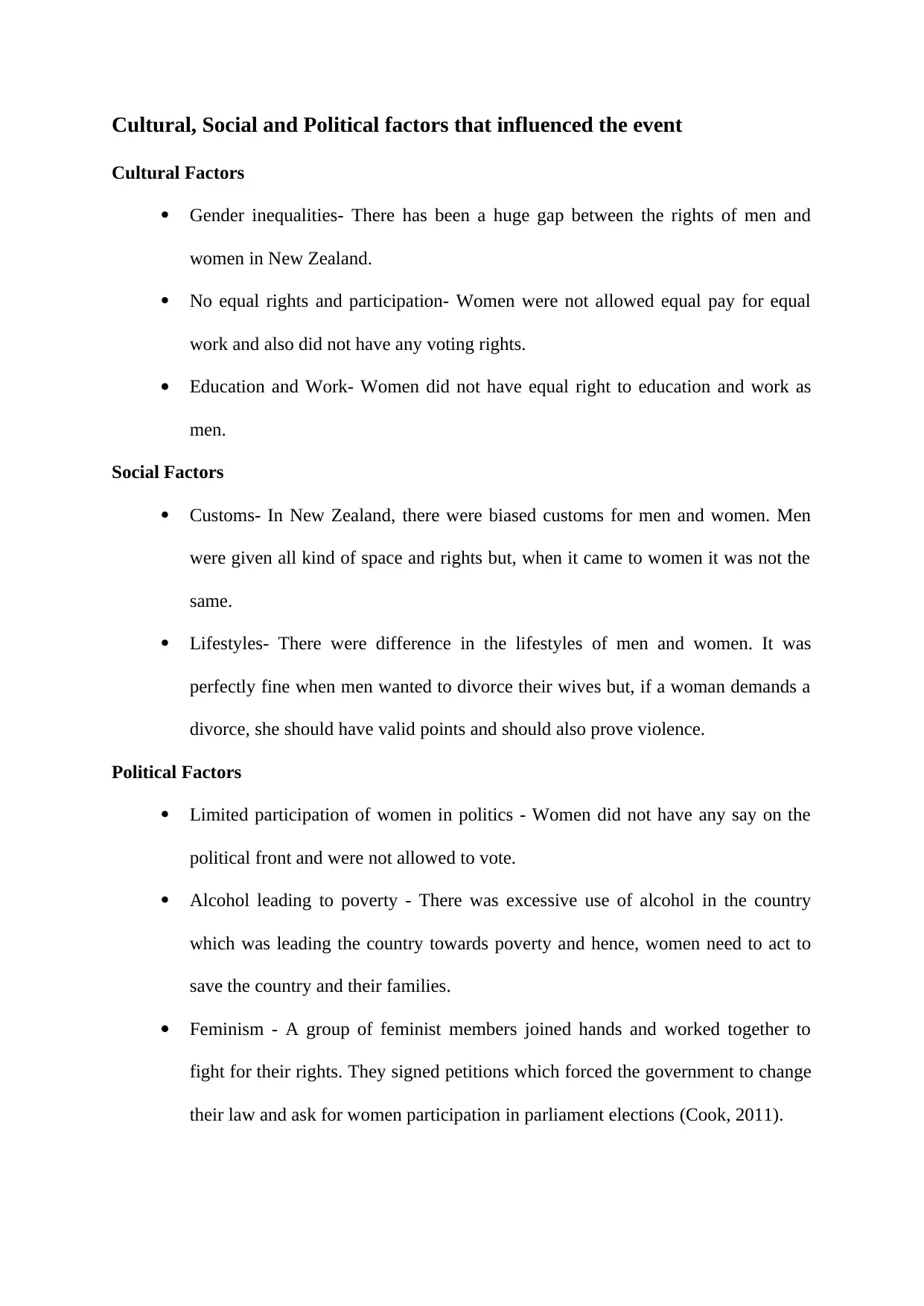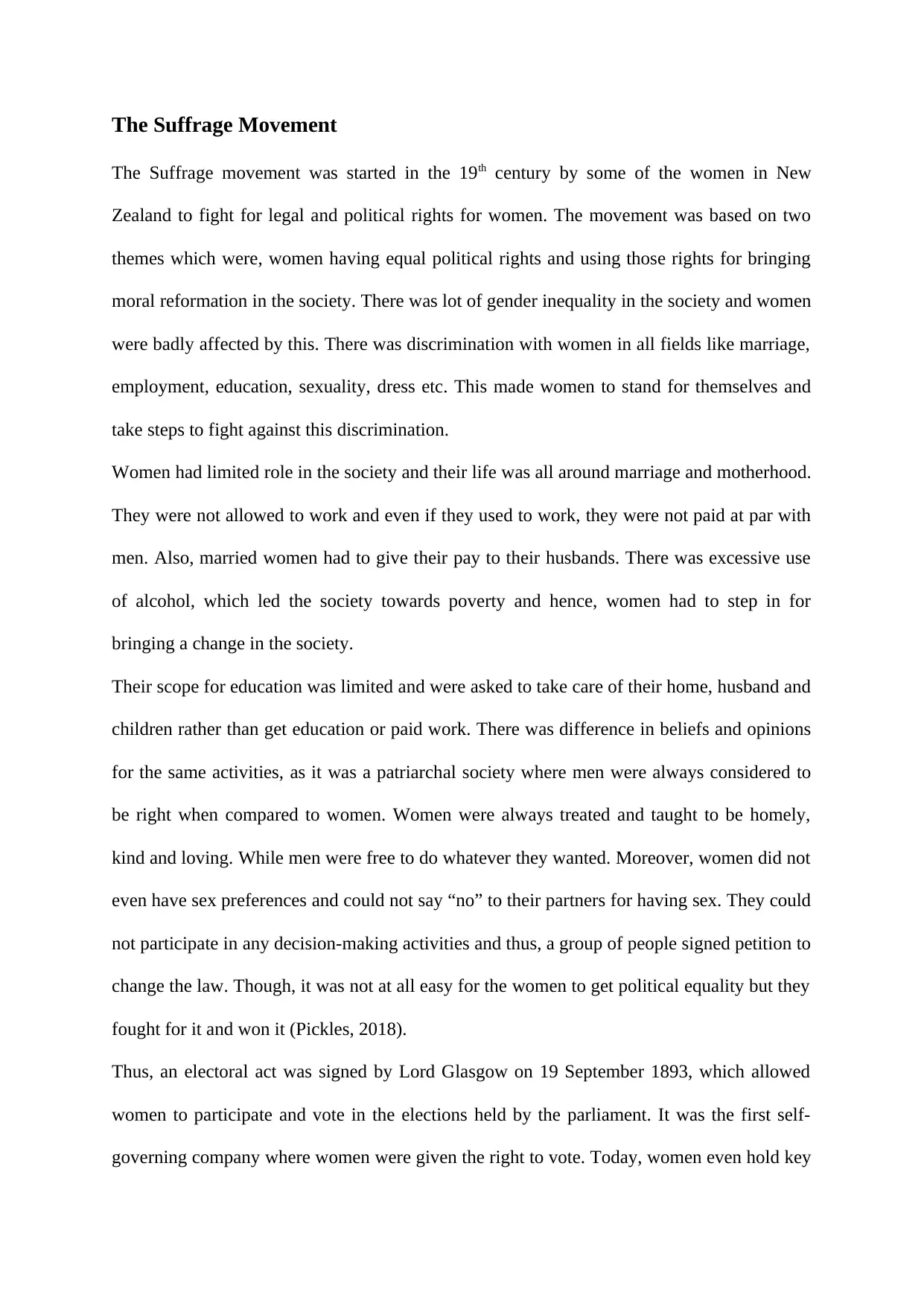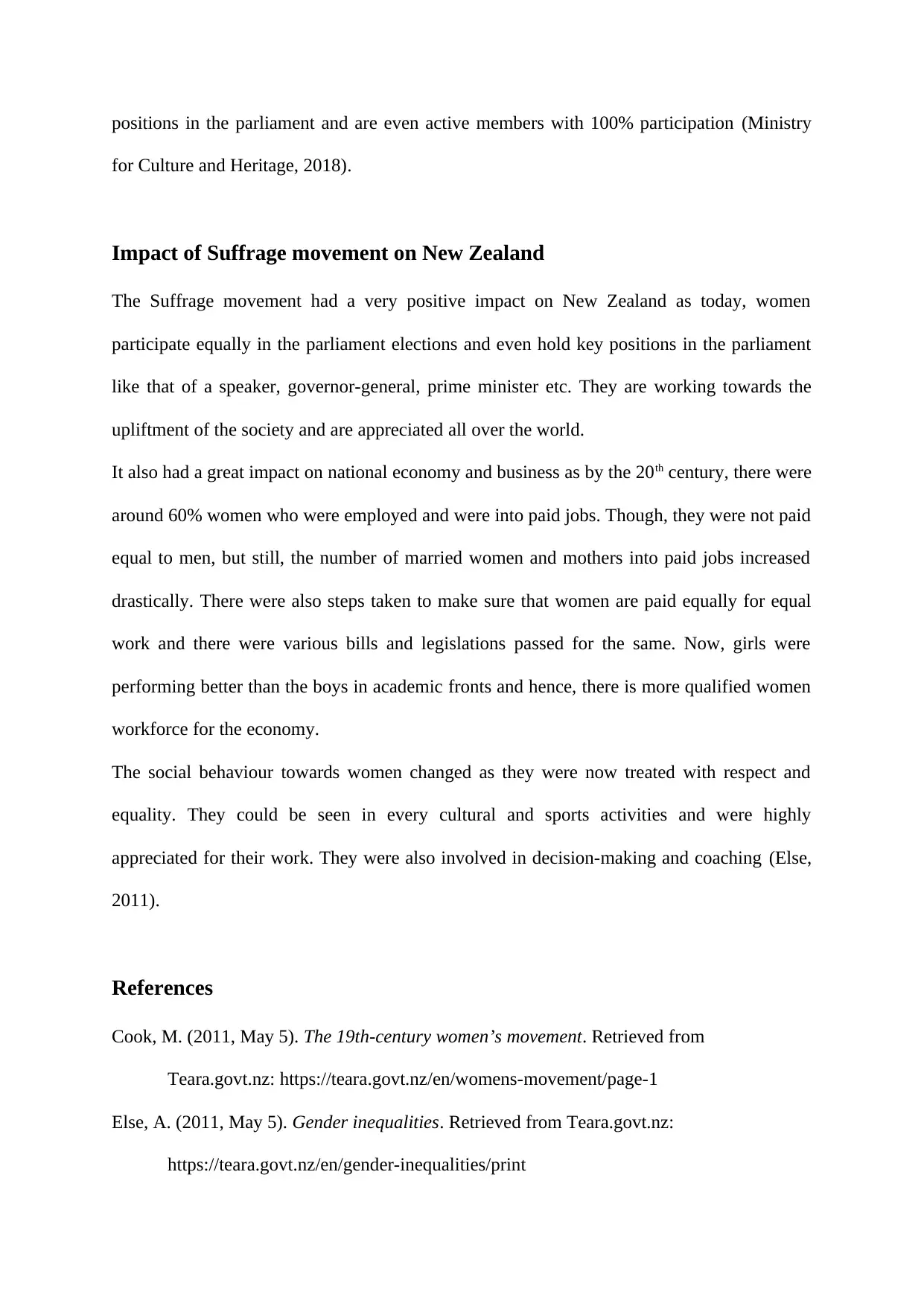The Granting of Women's Suffrage in New Zealand: Key Factors
VerifiedAdded on 2023/05/30
|6
|1053
|163
Essay
AI Summary
This essay examines the granting of women's suffrage in New Zealand, exploring the cultural, social, and political factors that influenced this historical event. It discusses the gender inequalities, biased customs, and limited political participation of women in 19th-century New Zealand. The essay details the Suffrage Movement, highlighting its themes of equal political rights and moral reformation, and the fight against discrimination in marriage, employment, and education. It also addresses the impact of excessive alcohol consumption and the role of feminist groups in petitioning for change. The signing of the Electoral Act in 1893, granting women the right to vote, is presented as a significant victory. Finally, the essay explores the positive impact of the Suffrage Movement on New Zealand, including increased female participation in politics and the workforce, improved social behavior towards women, and advancements in gender equality.

Women Granted Vote in New Zealand
Paraphrase This Document
Need a fresh take? Get an instant paraphrase of this document with our AI Paraphraser

Table of Contents
Cultural, Social and Political factors that influenced the event.................................................3
The Suffrage Movement............................................................................................................4
Impact of Suffrage movement on New Zealand........................................................................5
References..................................................................................................................................5
Cultural, Social and Political factors that influenced the event.................................................3
The Suffrage Movement............................................................................................................4
Impact of Suffrage movement on New Zealand........................................................................5
References..................................................................................................................................5

Cultural, Social and Political factors that influenced the event
Cultural Factors
Gender inequalities- There has been a huge gap between the rights of men and
women in New Zealand.
No equal rights and participation- Women were not allowed equal pay for equal
work and also did not have any voting rights.
Education and Work- Women did not have equal right to education and work as
men.
Social Factors
Customs- In New Zealand, there were biased customs for men and women. Men
were given all kind of space and rights but, when it came to women it was not the
same.
Lifestyles- There were difference in the lifestyles of men and women. It was
perfectly fine when men wanted to divorce their wives but, if a woman demands a
divorce, she should have valid points and should also prove violence.
Political Factors
Limited participation of women in politics - Women did not have any say on the
political front and were not allowed to vote.
Alcohol leading to poverty - There was excessive use of alcohol in the country
which was leading the country towards poverty and hence, women need to act to
save the country and their families.
Feminism - A group of feminist members joined hands and worked together to
fight for their rights. They signed petitions which forced the government to change
their law and ask for women participation in parliament elections (Cook, 2011).
Cultural Factors
Gender inequalities- There has been a huge gap between the rights of men and
women in New Zealand.
No equal rights and participation- Women were not allowed equal pay for equal
work and also did not have any voting rights.
Education and Work- Women did not have equal right to education and work as
men.
Social Factors
Customs- In New Zealand, there were biased customs for men and women. Men
were given all kind of space and rights but, when it came to women it was not the
same.
Lifestyles- There were difference in the lifestyles of men and women. It was
perfectly fine when men wanted to divorce their wives but, if a woman demands a
divorce, she should have valid points and should also prove violence.
Political Factors
Limited participation of women in politics - Women did not have any say on the
political front and were not allowed to vote.
Alcohol leading to poverty - There was excessive use of alcohol in the country
which was leading the country towards poverty and hence, women need to act to
save the country and their families.
Feminism - A group of feminist members joined hands and worked together to
fight for their rights. They signed petitions which forced the government to change
their law and ask for women participation in parliament elections (Cook, 2011).
⊘ This is a preview!⊘
Do you want full access?
Subscribe today to unlock all pages.

Trusted by 1+ million students worldwide

The Suffrage Movement
The Suffrage movement was started in the 19th century by some of the women in New
Zealand to fight for legal and political rights for women. The movement was based on two
themes which were, women having equal political rights and using those rights for bringing
moral reformation in the society. There was lot of gender inequality in the society and women
were badly affected by this. There was discrimination with women in all fields like marriage,
employment, education, sexuality, dress etc. This made women to stand for themselves and
take steps to fight against this discrimination.
Women had limited role in the society and their life was all around marriage and motherhood.
They were not allowed to work and even if they used to work, they were not paid at par with
men. Also, married women had to give their pay to their husbands. There was excessive use
of alcohol, which led the society towards poverty and hence, women had to step in for
bringing a change in the society.
Their scope for education was limited and were asked to take care of their home, husband and
children rather than get education or paid work. There was difference in beliefs and opinions
for the same activities, as it was a patriarchal society where men were always considered to
be right when compared to women. Women were always treated and taught to be homely,
kind and loving. While men were free to do whatever they wanted. Moreover, women did not
even have sex preferences and could not say “no” to their partners for having sex. They could
not participate in any decision-making activities and thus, a group of people signed petition to
change the law. Though, it was not at all easy for the women to get political equality but they
fought for it and won it (Pickles, 2018).
Thus, an electoral act was signed by Lord Glasgow on 19 September 1893, which allowed
women to participate and vote in the elections held by the parliament. It was the first self-
governing company where women were given the right to vote. Today, women even hold key
The Suffrage movement was started in the 19th century by some of the women in New
Zealand to fight for legal and political rights for women. The movement was based on two
themes which were, women having equal political rights and using those rights for bringing
moral reformation in the society. There was lot of gender inequality in the society and women
were badly affected by this. There was discrimination with women in all fields like marriage,
employment, education, sexuality, dress etc. This made women to stand for themselves and
take steps to fight against this discrimination.
Women had limited role in the society and their life was all around marriage and motherhood.
They were not allowed to work and even if they used to work, they were not paid at par with
men. Also, married women had to give their pay to their husbands. There was excessive use
of alcohol, which led the society towards poverty and hence, women had to step in for
bringing a change in the society.
Their scope for education was limited and were asked to take care of their home, husband and
children rather than get education or paid work. There was difference in beliefs and opinions
for the same activities, as it was a patriarchal society where men were always considered to
be right when compared to women. Women were always treated and taught to be homely,
kind and loving. While men were free to do whatever they wanted. Moreover, women did not
even have sex preferences and could not say “no” to their partners for having sex. They could
not participate in any decision-making activities and thus, a group of people signed petition to
change the law. Though, it was not at all easy for the women to get political equality but they
fought for it and won it (Pickles, 2018).
Thus, an electoral act was signed by Lord Glasgow on 19 September 1893, which allowed
women to participate and vote in the elections held by the parliament. It was the first self-
governing company where women were given the right to vote. Today, women even hold key
Paraphrase This Document
Need a fresh take? Get an instant paraphrase of this document with our AI Paraphraser

positions in the parliament and are even active members with 100% participation (Ministry
for Culture and Heritage, 2018).
Impact of Suffrage movement on New Zealand
The Suffrage movement had a very positive impact on New Zealand as today, women
participate equally in the parliament elections and even hold key positions in the parliament
like that of a speaker, governor-general, prime minister etc. They are working towards the
upliftment of the society and are appreciated all over the world.
It also had a great impact on national economy and business as by the 20th century, there were
around 60% women who were employed and were into paid jobs. Though, they were not paid
equal to men, but still, the number of married women and mothers into paid jobs increased
drastically. There were also steps taken to make sure that women are paid equally for equal
work and there were various bills and legislations passed for the same. Now, girls were
performing better than the boys in academic fronts and hence, there is more qualified women
workforce for the economy.
The social behaviour towards women changed as they were now treated with respect and
equality. They could be seen in every cultural and sports activities and were highly
appreciated for their work. They were also involved in decision-making and coaching (Else,
2011).
References
Cook, M. (2011, May 5). The 19th-century women’s movement. Retrieved from
Teara.govt.nz: https://teara.govt.nz/en/womens-movement/page-1
Else, A. (2011, May 5). Gender inequalities. Retrieved from Teara.govt.nz:
https://teara.govt.nz/en/gender-inequalities/print
for Culture and Heritage, 2018).
Impact of Suffrage movement on New Zealand
The Suffrage movement had a very positive impact on New Zealand as today, women
participate equally in the parliament elections and even hold key positions in the parliament
like that of a speaker, governor-general, prime minister etc. They are working towards the
upliftment of the society and are appreciated all over the world.
It also had a great impact on national economy and business as by the 20th century, there were
around 60% women who were employed and were into paid jobs. Though, they were not paid
equal to men, but still, the number of married women and mothers into paid jobs increased
drastically. There were also steps taken to make sure that women are paid equally for equal
work and there were various bills and legislations passed for the same. Now, girls were
performing better than the boys in academic fronts and hence, there is more qualified women
workforce for the economy.
The social behaviour towards women changed as they were now treated with respect and
equality. They could be seen in every cultural and sports activities and were highly
appreciated for their work. They were also involved in decision-making and coaching (Else,
2011).
References
Cook, M. (2011, May 5). The 19th-century women’s movement. Retrieved from
Teara.govt.nz: https://teara.govt.nz/en/womens-movement/page-1
Else, A. (2011, May 5). Gender inequalities. Retrieved from Teara.govt.nz:
https://teara.govt.nz/en/gender-inequalities/print

Ministry for Culture and Heritage. (2018, September 24). Women and the vote. Retrieved
from Nzhistory.govt.nz: https://nzhistory.govt.nz/politics/womens-suffrage
Pickles, K. (2018, September 19). Why New Zealand was the first country where women won
the right to vote. Retrieved from Theconversation.com:
http://theconversation.com/why-new-zealand-was-the-first-country-where-women-
won-the-right-to-vote-103219
from Nzhistory.govt.nz: https://nzhistory.govt.nz/politics/womens-suffrage
Pickles, K. (2018, September 19). Why New Zealand was the first country where women won
the right to vote. Retrieved from Theconversation.com:
http://theconversation.com/why-new-zealand-was-the-first-country-where-women-
won-the-right-to-vote-103219
⊘ This is a preview!⊘
Do you want full access?
Subscribe today to unlock all pages.

Trusted by 1+ million students worldwide
1 out of 6
Related Documents
Your All-in-One AI-Powered Toolkit for Academic Success.
+13062052269
info@desklib.com
Available 24*7 on WhatsApp / Email
![[object Object]](/_next/static/media/star-bottom.7253800d.svg)
Unlock your academic potential
Copyright © 2020–2026 A2Z Services. All Rights Reserved. Developed and managed by ZUCOL.





